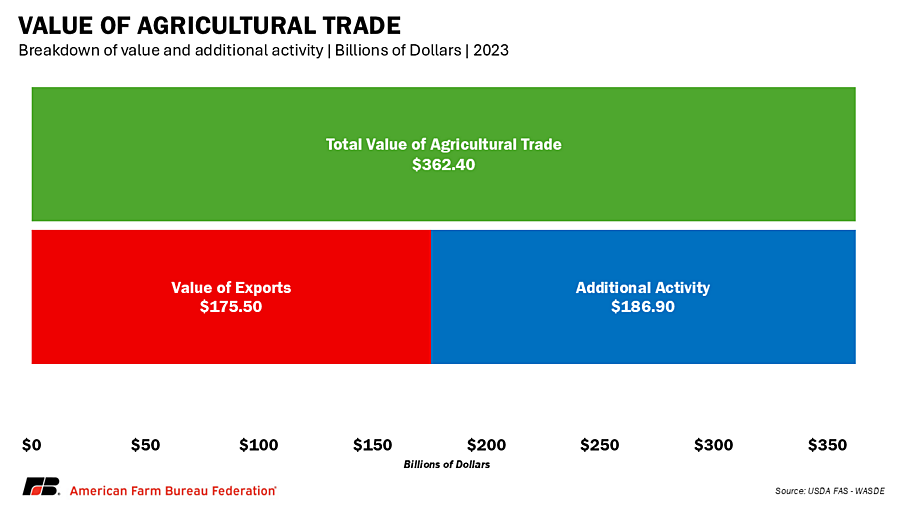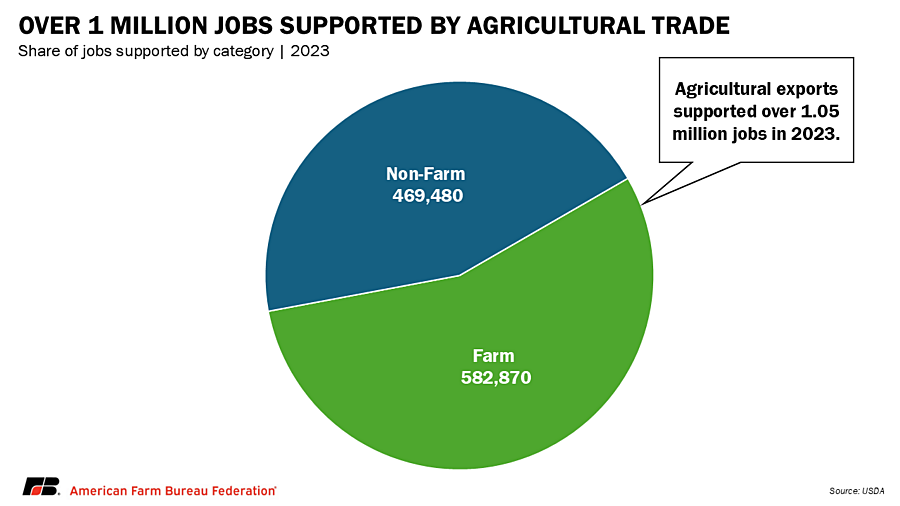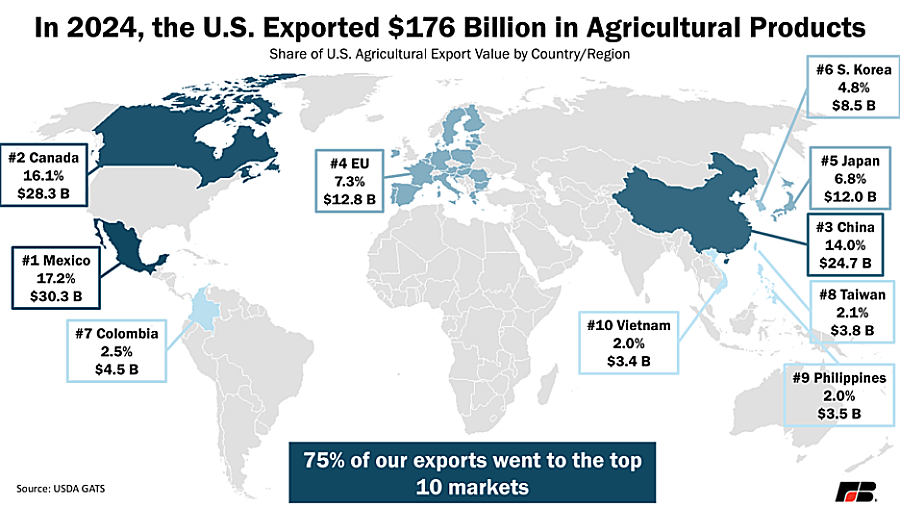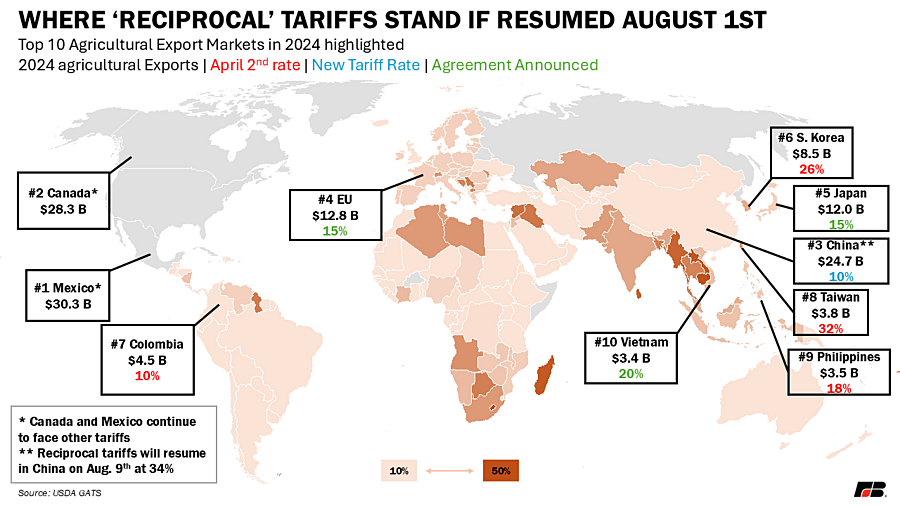Trade is a hot topic with a lot of uncertainty. Trade policy decisions being made in Washington, D.C., will impact farmers and ranchers in the countryside. This Market Intel report is a continuation in the series exploring different topics related to agricultural trade, including the potential impacts of trade policy changes.
Agricultural trade plays a vital role in the American economy. It supports U.S. farmers while driving economic growth and job creation across the country. With more than 20% of U.S. agricultural production
sold abroad, exports are a key part of this picture. On average, every dollar of agricultural exports generates $2.06 in additional economic activity within the United States.
Recently, USDA updated its Agricultural Trade Multipliers, which help measure the full impact of agricultural exports. This Market Intel breaks down how trade benefits the U.S. economy, highlights key challenges such as non-tariff barriers, and reviews recent trade policy developments ahead of the Aug. 1 tariff deadline.
Economic Impact of Agricultural Exports
In 2023, U.S. agricultural exports were valued at $175.5 billion. These exports supported an additional $186.9 billion in related economic activity, for a total of $362.4 billion in output. Agriculture exports are an economic engine benefiting the entire U.S. economy. The value created by agricultural exports reaches far beyond the farm, extending across the economy, especially in sectors like transportation, logistics and port operations.
Agricultural trade supports a significant number of American jobs. In 2023, U.S. agricultural exports supported 1.05 million full-time jobs. About 469,000 of these were on farms. The rest, over 580,000 jobs, were in related sectors such as trucking, warehousing, processing, shipping and trade services. This means that when a farmer exports a product, they help support jobs nationwide- from transporting and storing crops to preparing them for shipment overseas.
Non-Tariff Barriers Limit Market Access
The U.S. recently shifted its trade policy to reduce non-tariff barriers to trade. On April 2, the administration introduced reciprocal tariffs based on the balance of trade and an additional 10% baseline tariff on most imports. The enforcement of reciprocal tariffs was paused on April 9, giving foreign countries until Aug. 1 to negotiate new trade terms. In the interim, the additional 10% tariff on all imports has remained, as have additional tariffs on key partners.
As the Aug. 1 deadline approaches, markets are closely watching for the announcement of new trade agreements and expanded market access. These negotiations represent an important opportunity to address long-standing non-tariff barriers and create more opportunities for U.S. exports, especially in agriculture.
Non-tariff barriers continue to restrict farmers’ ability to compete in global markets. Unlike tariffs, which function as taxes on imports, non-tariff barriers are rules or regulations that make it harder, or sometimes impossible, for foreign goods to enter a market. These include differing food safety or biotechnology standards, overly strict or non-scientific sanitary and phytosanitary (SPS) rules, and import quotas that limit the volume of goods eligible for low tariffs. For example, the European Union restricts imports of genetically modified crops and certain U.S. meat products based on how they are processed, regardless of scientific safety assessments. These types of trade barriers slow export growth leading to reduced farm income and limited economic growth opportunities for rural communities.
There is some recent progress on this front. Australia has agreed to ease longstanding restrictions on U.S. beef imports, which were originally implemented in 2003 due to concerns over bovine spongiform encephalopathy. Also known as “mad cow disease,” bovine spongiform encephalopathy is a rare but serious neurological disorder in cattle that raised global food safety concerns in the early 2000s. This is a positive development for U.S. beef producers in the long run, as it removes a key regulatory barrier. However, near-term export gains may be limited. U.S. beef prices remain significantly higher than Australia’s, linked to record low U.S. cattle inventories, making it difficult to compete in that market despite the improved access. Reducing non-tariff barriers remains essential to strengthening U.S. agriculture and expanding global market opportunities.
Trade Deals Open New Doors
Recent trade pacts announced ahead of the Aug. 1 deadline under Executive Order 14316 have the potential to open new markets for U.S. agriculture. Without these deals, countries face steep reciprocal tariffs ranging from 15% to 50% on goods entering the United States. The following deals have been announced by the White House. Notably, these announcements have been fairly informal and have not been accompanied by a formal executive order, or legislation, outlining the trade deal and are therefore subject to change
- United Kingdom (June 16):
- Removes tariffs on U.S. beef and ethanol (U.S. products must still comply with UK standards).
- Streamlines customs procedures for U.S. exports.
- Goods imported from the United Kingdom will face a 10% tariff.
- Vietnam (July 2):
- Provides zero-tariff access for U.S. beef, corn and dairy.
- U.S. suspends threatened 46% tariffs on Vietnamese imports and imposes a 20% tariff on all goods.
- Additionally, goods that are “transshipped” will face a 40% tariff.
- Japan (July 22):
- Sets a 15% reciprocal tariff on Japanese goods, down from 25%.
- Japan commits to $550 billion in U.S. investments.
- Japan expands purchases of U.S. rice, corn, soybeans and sustainable fuels.
- Indonesia (July 22):
- Eliminates most non-tariff barriers on U.S. agriculture products.
- Committed to buying $4.5 billion of soybeans, soybean meal, wheat and cotton.
- Recognizes U.S. regulatory authorities and accepts certificates from U.S. agencies.
- Reciprocal U.S. tariffs capped at 19%, avoiding a proposed 32%.
- European Union (July 27, key details still emerging):
- Reciprocal U.S. tariff set at 15% on EU goods.
- EU agrees to buy $750 billion worth of U.S. energy products.
- EU agrees to not retaliate against the U.S.
These deals are part of a broader strategy to avoid the implementation of higher reciprocal tariffs. The White House has stated that countries failing to reach agreements by Aug. 1 will face full reciprocal tariff rates, which are intended to encourage fair and reciprocal trade.
With the deadline approaching, additional deals may be announced. Ongoing negotiations with key U.S. trade partners remain critical, as U.S. agricultural interests push for stronger market access and reduced trade barriers. For farmers and ranchers, these agreements offer meaningful opportunities to grow exports, reduce uncertainty and compete more effectively in the global marketplace.
Conclusion: Trade Strengthens American Agriculture
Agricultural trade is vital to the U.S. economy and to the long-term success of American farms and ranches. It generates billions in economic activity, supports over a million jobs, and helps connect U.S. agriculture to growing global markets.
America’s farmers and ranchers lead the world in producing safe, sustainable food, fiber and fuel. Reliable and robust trade is essential not only to the national economy, but also to the economic sustainability of family farms and rural communities.





